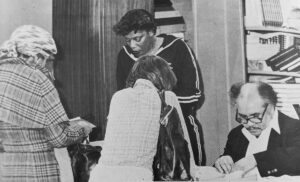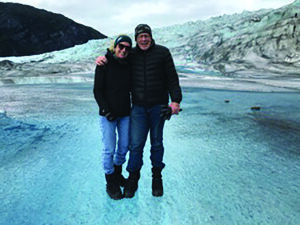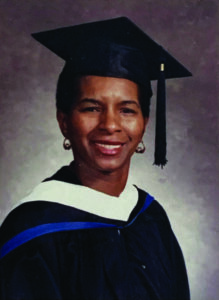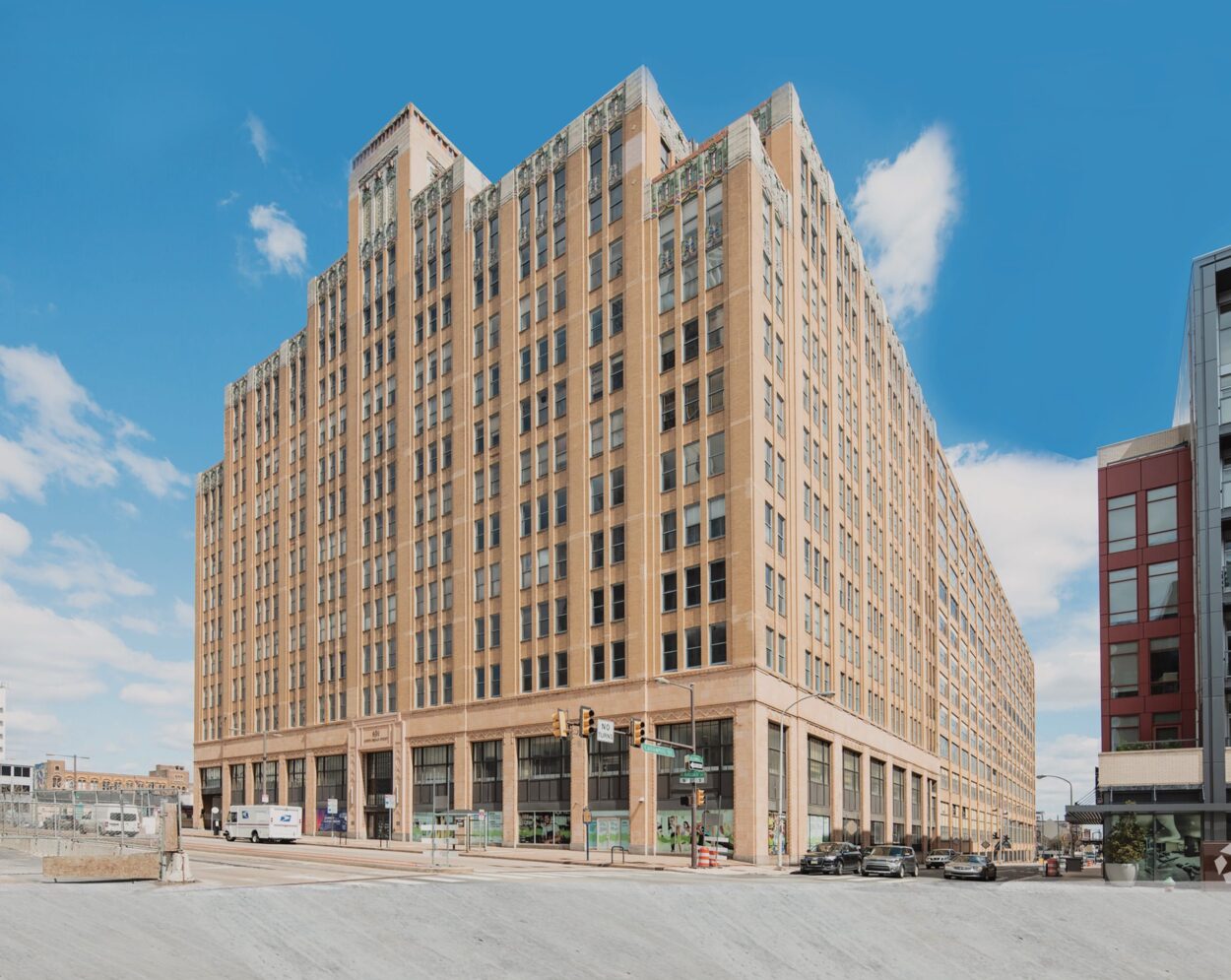Like many Antioch students, Laura Speight-Reddick ’80 (Antioch Philadelphia, BA) realized a little late that she was not only interested in a college education but also capable of doing the work. But most colleges were not set up for someone like her, a working woman in her twenties with bills to pay and little in the way of savings. Fortunately, she heard about Antioch Philadelphia—a school designed for older adults that, while it was open, made a big impact in many students’ lives.
“This was 1978,” Reddick recalls, “and I was a cashier at the Chuck Wagon near Antioch on Broad Street. I’m a people person, so I was always talking to the customers when they came in, whether it was Maurice Cheeks of the 76ers or Dr. Alvin Revell, the deputy dean at Antioch. Dr. Revell saw me reading this book, What Color Is Your Parachute? and he asked me,
‘What do you want to do with the rest of your life?’

That got her thinking. She wanted to make more money and work a more interesting job, but she hadn’t known how to go about it. No one in her family had gone to college; it seemed like foreign territory to her. So when Revell invited her to an Antioch information session, Reddick decided to go. Once there, she learned that classes were held at night, so she could keep her job. She learned that she might even earn prior learning credits for her life experiences. And a financial aid worker explained how with grants and loans she could afford college.
“I had to decide if it was an investment I wanted to make,” Reddick continues. “When I compared the jobs I wanted to the jobs I was working, I saw that a degree was the difference. So college seemed like a wise investment. I had been a great high school student, at the top of my class, and I was disappointed that I didn’t go to college right away out of high school. But Antioch catered to adult learners.” As she puts it, “Here was a second chance.”
“What they taught was based on issues we were actually experiencing”
A few years before Reddick decided to enroll to complete her BA, another Philadelphian, Tom Kaney ‘78 (Antioch Philadelphia, MA), found himself in a somewhat different bind. He had already earned his BA, but now he was in a middle management position. He found he needed a master’s degree not only to move up but also to develop managerial skills to do a better job. He briefly enrolled in the MBA program at Temple, but it was too theoretical, too removed from his actual challenges at work. That’s when he heard about a graduate program aimed at working adults. Originally a part of Drexel University, the program had recently been absorbed into Antioch Philadelphia.
“I knew one of the professors, Stan Kite,” Kaney remembers. “And he told me the program was restarting as Antioch. He knew my job situation and my frustration with Temple. And he said, ‘You should really consider this program.’ This was the fall of ’76 in Center City Philadelphia, and I was part of the first class. The classes were at night and on one or two weekends a month. It was aimed at working professionals, and most of what they taught was based on issues we were actually experiencing at our jobs.”
Another alum, Diana Collins ‘86 (Antioch Philadelphia, BA), was in one of the campus’ final graduating classes. Like Reddick, Collins had not gone to college right after high school. Instead she worked selling jewelry at a department store while she raised a family. When she got laid off there, a temp agency sent her to work in the bookstore at the University of Pennsylvania. She proved such a good worker that the bookstore hired her full-time and encouraged her to finish a bachelor’s degree.
By this point, she had earned an associate degree from the Community College of Philadelphia. But when Collins tried to take courses at Penn, they wouldn’t accept some of her community college credits. “It was so frustrating,” she recalls. “I felt like I’d been going to night school forever.” When she took courses at Penn’s Wharton School of Business, she “felt all alone.” She tried to study with her fellow students, but “they were stand-offish.”
That was when a friend who was also a colleague at the bookstore told her about Antioch. “She said, ‘It’s small classes, older students who are serious. You get personal help. You won’t get lost in the crowd.’ I said, ‘For real?’…I went to an open house, and I decided this was something I could take a chance on.”
Collins liked the Antioch courses on psychology, computers, and writing. One class got her started writing a journal, and she still keeps up with it three decades later. But what she liked the most was the way the school linked her education to her work life. In her first year, for example, she was assigned to write an analysis of her place of employment that involved researching the history of Penn and interviewing several of the faculty.
“We would also do role playing at Antioch,” Collins says. When she worked in Penn’s bookstore and library, “we often had people come in and start screaming about some complaint. At Antioch, we would act that out in class. One student would be the complainer and another the employee. Afterward, the professor and other students would discuss how we handled the situation, so we’d be better prepared when it happened in real life. I learned that when someone acts like that, it’s not about a book. It’s about other things in his or her life that had reached a tipping point. And I learned to say, ‘I apologize for that—let’s see how we can rectify the situation.’ I learned not to fight fire with fire but to stay calm.”
It helped that most of Collins’ fellow students were her age or older, so they had enough experience in the work world to know what they needed from their education. “Everyone was about business,” Collins adds. “It wasn’t playing around like some of the other colleges where the younger students act out and hold up the class.”
“Adult learners are more focused,” agrees Reddick. “They choose college for a reason, not just because their parents expect it. Maybe they worked as a clerk for twenty years, and when someone came in with a college degree to be their supervisor, they had to train the new person. You value your time and money too, because you know how scarce they can be.” Reddick eventually got a work-study job in Antioch’s admissions office. She had a way of putting applicants at ease—especially those who were working adults like herself.
“To be a good leader, you have to develop other leaders.”
“It wasn’t about taking everyone who applied,” Reddick says. “I had to assess each person and make sure Antioch was the right fit for him or her. And if it wasn’t, I had to advise the person what school would be better.” The school was the right fit for Reddick both as student and employee. She discovered that she had leadership qualities she had never suspected. Perhaps her most memorable Antioch experience was a weekend-long workshop on group dynamics as part of a professional development class.
“We were locked in for the whole weekend,” she remembers. “We were given a case study and a time frame for fixing it. We had to decide who was going to be the leader and who was going to be the timekeeper. Some groups didn’t get their work done, because they were fighting over who was doing what. I didn’t come in and try to take over—I would always wait and let the group choose me.”
The exercise gave students a challenge and an opportunity for reflection. Says Reddick, “Eventually I learned to let other people have a chance to lead. To be a good leader, you have to develop other leaders. I learned to be a critical thinker, to think outside the box, to share my ideas even if they seemed silly or strange…In a real work environment, that’s what you have to do. You have to become a team player.”

When Kaney entered Antioch, he was spending his work life in the “fortunate/unfortunate,” as he puts it, position of leading an organization despite the lack of “any management experience. I did different jobs, kept moving up, and by the time I was 28, I was in charge of the whole thing. I needed to learn how to lead, how to organize.”
At Temple, he’d been surrounded by youngsters without much work experience. At Antioch, he was with folks like himself, people who had assumed a lot of responsibility without the credentials and the training that usually went along with the job.
“We had people from all walks of life,” Kaney recalls. “Preachers, teachers, business people, healthcare professionals, department heads, or, a level below that, middle managers. It was pretty balanced Black and white, male and female. That diversity was a cornerstone of the program. What we brought to the program was our different experiences, which was our contribution to the readings and the faculty.”
“Whatever they’re doing, they’re trying to make society better.” Just as the students worked at jobs during the day and attended classes at night, most of the faculty taught at schools such as Wharton, Temple, Drexel and UPenn during the day and led Antioch classes at night. “They had a passion for this subject matter,” explains Kaney, “and they loved the innovation this program represented.”
After Kaney got his master’s degree from Antioch, he was recruited by the Hay Group, a consulting firm that specialized in compensation issues. Kaney pushed his new employers to allow him to go beyond the numbers and to branch into helping with employee appraisals and rewards. He was so successful that one of the Hay Group’s clients, Subaru of America, hired him away as an HR specialist.

When Collins got her bachelor’s degree from Antioch, she was able to move up at UPenn to a position as a Library Service Assistant. She held that job for 35 years before retiring. “I’d wanted to be a librarian since I was a kid. I’d always loved books. My degree helped me get that job. Antioch taught me to be a little more assertive and professional. If I didn’t have certain skills, Antioch had taught me how to go get them.”
Reddick in turn got both her bachelor’s degree and her master’s at Antioch in Philadelphia. After taking several years off to raise her family, she parlayed her admissions experience at Antioch into a job as an admission counselor at Temple, where she worked for 31 years in various administration positions before retiring earlier this year.
She explains how studying at Antioch Philadelphia influenced her career by telling the story of when Temple asked her to set up a Veteran Affairs Office in 2010. “When I started the office,” she says, “I made it a one-stop shop by bringing in everyone at the college that dealt with a veteran. That’s what I learned at Antioch: everyone needs to know what everyone else is doing. We streamlined the process to make it more user-friendly for the student. Adult learners don’t want to waste time—they want to get things done efficiently. We earned a national reputation for being a military-friendly school.”
Antioch Philadelphia faced financial problems in the ’80s that forced the campus to close. These challenges had long affected the campus—Reddick remembers going months without a paycheck during one crisis—but although the campus is closed, its alumni are still making an impact throughout eastern Pennsylvania.
“Antioch changed society,” Reddick says. “If you look at Antiochians in Philadelphia, they are doctors, lawyers, and educators—and, whatever they’re doing, they’re trying to make society better. That’s because we were in a college for social change. People came to Antioch because [Antioch] saw that people who’d been working in their professions had intelligence, skills, and knowledge that should be recognized with a credential. We all have to work unless we’re rich, so when you choose to go to college at night, it’s a hard choice.” Nonetheless, it was a choice made happily by the students whose lives were changed by studying on this campus. “We missed Dynasty and Dallas,” says Reddick, “but we had a VCR. So we could watch them later.”
To read our oral history of the Maryland Campus from a previous Antioch Alumni Magazine, visit news.antioch.edu/maryland-history



